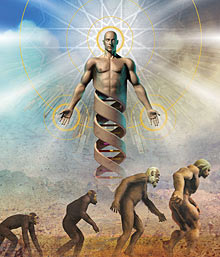 |
 |
 |
 News from Around the Americas | May 2005 News from Around the Americas | May 2005  
Kansas Debate Challenges Science Itself
 Associated Press Associated Press


| | The Kansas board deleted most references to evolution from the science standards in 1999, but elections the next year resulted in a less conservative board, which led to the current, evolution-friendly standards. Conservatives recaptured the board's majority in 2004. |
Topeka, Kan. - The Kansas school board's hearings on evolution weren't limited to how the theory should be taught in public schools. The board is considering redefining science itself. Advocates of "intelligent design" are pushing the board to reject a definition limiting science to natural explanations for what's observed in the world.

Instead, they want to define it as "a systematic method of continuing investigation," without specifying what kind of answer is being sought. The definition would appear in the introduction to the state's science standards.

The proposed definition has outraged many scientists, who are frustrated that students could be discussing supernatural explanations for natural phenomena in their science classes.

"It's a completely unscientific way of looking at the world," said Keith Miller, a Kansas State University geologist.

The conservative state Board of Education plans to consider the proposed changes by August. It is expected to approve at least part of a proposal from advocates of intelligent design, which holds that the natural world is so complex and well-ordered that an intelligent cause is the best way to explain it.

State and national science groups boycotted last week's public hearings, claiming they were rigged against evolution.

Stephen Meyer, a senior fellow at the Seattle-based Discovery Institute, which supports intelligent design, said changing the schools' definition of science would avoid freezing out questions about how life arose and developed on Earth.

The current definition is "not innocuous," Meyer said. "It's not neutral. It's actually taking sides."

Last year, the board asked a committee of educators to draft recommendations for updating the standards, then accepted two rival proposals.

One, backed by a majority of those educators, continues an evolution-friendly tone from the current standards. Those standards would define science as "a human activity of systematically seeking natural explanations for what we observe in the world around us." That's close to the current definition.

The other proposal is backed by intelligent design advocates and is similar to language in Ohio's standards. It defines science as "a systematic method of continuing investigation" using observation, experiment, measurement, theory building, testing of ideas and logical argument to lead to better explanations of natural phenomena.

The Kansas board deleted most references to evolution from the science standards in 1999, but elections the next year resulted in a less conservative board, which led to the current, evolution-friendly standards. Conservatives recaptured the board's majority in 2004.

Jonathan Wells, a Discovery Institute senior fellow, said the dispute won't be settled in public hearings like the ones in Kansas.

"I think it will be resolved in the scientific community," he said. "I think (intelligent design), in 10 years, will be a very respectable science program."

Evolution defenders scoff at the notion.

"In order to live in this science-dominated world, you have to be able to discriminate between science and non-science," said Alan Leshner of the American Association for the Advancement of Science. "They want to rewrite the rules of science." | 
 | |
 |



